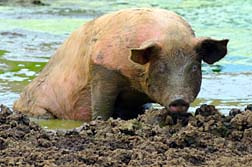 At the moment, heparin is fashioned from the intestines of pigs. Most of the raw materials for heparin come from China, and most of that is derived from a largely unregulated industry operating in less-then-pristine conditions. It all combines to contaminate the industry in more ways than the contaminate itself, and given the sheer size and breadth of the Chinese heparin industry—and the near impossibility to clean it up—scientists have resolved to come up with a better solution.
At the moment, heparin is fashioned from the intestines of pigs. Most of the raw materials for heparin come from China, and most of that is derived from a largely unregulated industry operating in less-then-pristine conditions. It all combines to contaminate the industry in more ways than the contaminate itself, and given the sheer size and breadth of the Chinese heparin industry—and the near impossibility to clean it up—scientists have resolved to come up with a better solution.And they think they have, with synthetic heparin. Professor Robert Linhardt, the Ann and John H. Broadbent Jr. '59 Senior Constellation Professor of Biocatalysis and Metabolic Engineering at Rensselaer Polytechnic Institute in Troy, has been working on a synthetic version of heparin for years. The tainted heparin scandal has only intensified that effort.
"When we found the contamination, it was another sign that the way we currently manufacture heparin is simply unsafe," Linhardt said in a statement. "Unlike the current heparin that is harvested from possibly disease carrying animals in often very poor conditions, our fully synthetic heparin will be created in a pharmaceutical manufacturing environment from fermentation to packaging. This will give drug manufacturers extreme control over the safety and purity of the product."
Together with Jian Liu of the University of North Carolina, Linhardt has been hard at it, and the duo discovered the synthetic roadmap for heparin in 2006. Over the last two years, Linhardt and Liu have been working to actually grow and create the synthetic heparin in the lab in sufficient quantity to at least make the idea of synthetic heparin a workable solution, given the vast quantity of heparin needed to satisfy the global market.
For their efforts, the researchers have successfully produced an amount of synthetic heparin that is a million times higher than any previous attempt, which is considered a huge step forward. Now comes the challenge of taking a dose that is currently measured in milligrams, and expand it to kilograms.
"Ultimately, drug companies are going to need to produce tons of this drug to keep up with global demand," Linhardt said. "Such levels of productions are further down the road. We think that in five years, it is very possible that this drug could reach human clinical trials."
Those clinical trials will be important, given the building blocks associated with synthetic heparin. To wit, if consumers were initially taken aback over the way in which traditional heparin is made—squeezed out of the intestines of pigs and cooked, like some kind of unsavory soup—then what are they to make of the backbone of the synthetic heparin?
READ MORE HEPARIN LEGAL NEWS
E. coli was found to be workable because the bacterium is common, and easily grown. And using vilified bacteria, as the basis for a drug is not new. Botox, for example, is a purified form of botulinium, the bacteria that causes botulism.
But will synthetic heparin, formed from E. coli, be any better than natural heparin squeezed out of the intestines of pigs in crude, offshore sweatshops?
Time will tell. In the meantime, the death toll linked to tainted heparin has reportedly risen to 80 with hundreds, if not thousands the world over taken seriously ill. Thus, while researchers cheer along synthetic heparin in the lab, the tainted natural heparin continues to reverberate through the courts.

READER COMMENTS
Dinkiedow
on
I clearly blew diner went into shock & .Now 5 years later oxygen 24/7 house bound & only offer is a peanut to be named later!